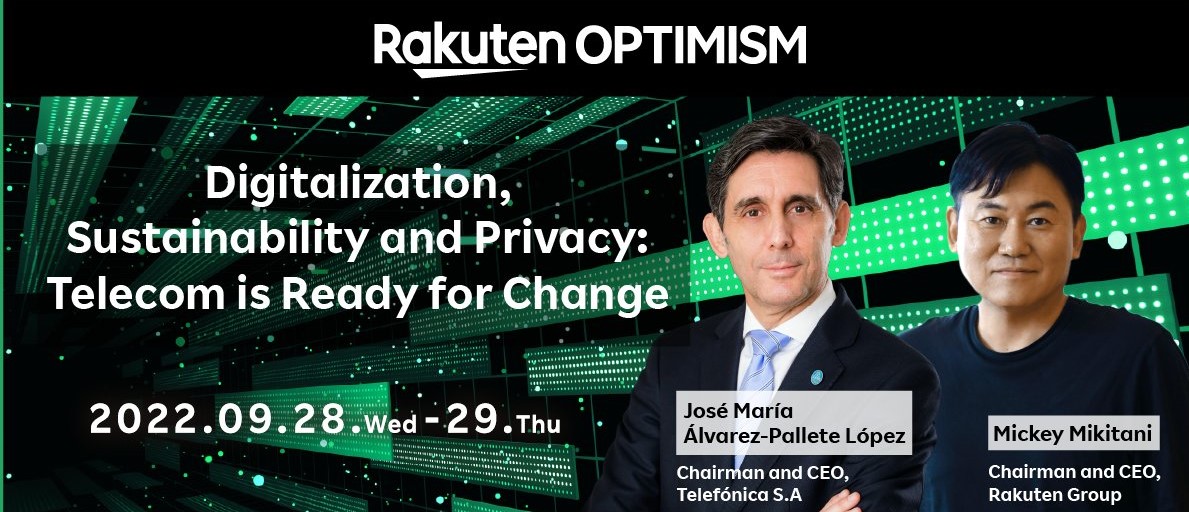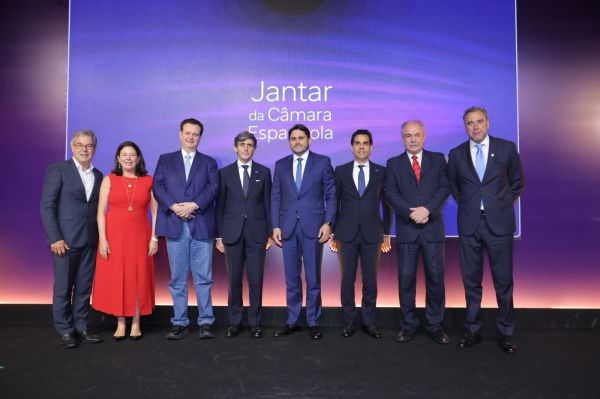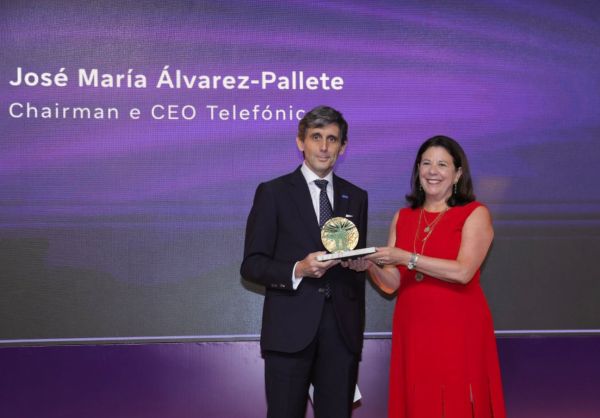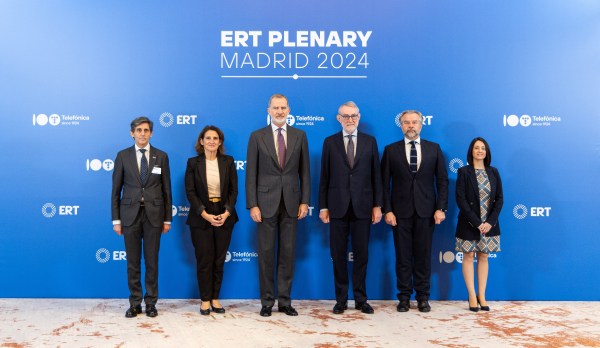Challenges still facing technology and connectivity today
The first topic that opened this conversation was the digital divide, which is a very palpable reality in our society. This term refers to the inequality and lack of means suffered today by groups of people with difficulties in accessing technology. Different types of digital divide are identified, categorised on the basis of geographical, gender, age, cultural and even economic criteria.
“Inequality is one of the most important challenges we face as a society. We need to make sure that this technological revolution leaves no one behind” said José María Álvarez-Pallete in response to Mikitani’s question on how he sees the different challenges that technology still faces in today’s society.
This is not the only challenge to be faced in this new technological era. The second most important challenge, according to Telefónica’s chairman, is the regularisation of people’s basic rights, which can be violated by the rapid advance of technology.
“This technological revolution is also affecting some basic rights. There are many aspects of basic rights that will be challenged. It’s time to have a digital law of rights.” The president of Telefónica commented when talking about the dangers of a massive development of technology.
The new technological reality has a real impact on people’s privacy, integrity and human rights, so there is a risk that if there are no political or physical boundaries to limit them, the risk to citizens can grow exponentially. The rules have changed, and setting limits and boundaries to the Internet is something that still needs to be given more importance on the public agenda today.
The importance of network security
The development of 5G and the magnitude of network security also featured in this conversation. For example, the pandemic revealed, among other things, the deficits that some companies and institutions have in terms of network security, whose main trigger was a forced digitisation in record time.
The implementation of 5G was and is a major breakthrough, the network is now more powerful, faster and with lower latency. This fifth mobile network generation is already enabling businesses and individuals to benefit from its advantages, as it can provide a thousand times the capacity that infrastructures could offer in 2010.
José María Álvarez-Pallete concluded on this issue by saying that “Networks are going to be faster, more extensive in terms of capacity, they are going to have zero or almost zero latency. 5G and fibre will mean a different world. But on top of that, we will remove the last bottlenecks for a fully cloudised and virtualised network with independent 5G, Open RAN, network tokenisation, etc.”
What’s to come, Web3 and metaverse
The emergence of the metaverse will combine the virtual environment with the real one and allow us to engage in activities such as playing games, meeting friends and even in the future it is expected that people will be able to work. However, this is only a small preview of what is to come.
“We are on the brink of something much bigger, which is web3 and the metaverse and, in that sense, OPEN RAN, virtualisation, softwarisation, tokenisation… the fact that AI will be massively embedded in our networks forces us to approach the network in a different way”. Telefónica’s Chairman stated in this block dedicated to future thinking about the future of communications, setting out a clear basis for Telefónica in this new virtual era to come.
What makes Telefónica’s chairman different from others?
Mickey Mikitani asked José María Álvarez-Pallete what set him apart from other leaders, highlighting his disruptive and innovative spirit.
The Chairman of Telefónica stated that it is the spirit of those who make up the company that make the work of transforming the world in which we live, making it increasingly more human.
“Telefónica has always been willing to embrace the latest technology. We were the first to deploy fibre on a massive scale in Europe, there is more fibre deployment in Spain than in the UK, Germany and Italy combined.”
One of the fundamental aspects of the company is to have people at the centre of its efforts, as technology is a tool at the service of people. That is why Telefónica does not simply offer a service, it offers the ability to make its customers create different spaces and elements in a way which, until today, has never been seen before.
“Network as a Service is a massive change because it basically means you are no longer selling capacity, speed or even latency. It is giving every customer the ability to run their own network, a virtualised network, on their own network in a very smart way. This is a game changer.” The Chairman of Telefónica commented on the question about innovation and the spirit of Telefónica.
This paradigm shift, known as NaaS (Network as a Service), is a milestone that aims to transform communication networks in different areas.
This new technology aims to develop and commercialise services over periods of days or weeks and even enable immersive Metaverse experiences. The potential of NaaS can transform the telecommunications world and change the Internet paradigm, leading to the creation of a future where applications and networks interact in a limitless and frictionless way.
How mobile industry contributes to sustainability in today’s society
Sustainability is becoming increasingly relevant in the telecommunications sector as a call to action from shareholders, investors, customers and employees.
Among Telefónica’s objectives is to be “net zero emissions”, an ambitious goal within the industry. Telefónica was one of the first companies to issue green bonds and to audit the environmental benefits of B2B services.
“By 2024, for our centenary, we want to be the first company in the world to switch off the carbon grid”, said José María Álvarez-Pallete said, once again underlining the company’s goal to drastically reduce CO2 emissions.
5G is gaining ground as a technology that has come to be a friend of the sustainability concept, optimising energy efficiency in buildings and reducing carbon emissions. Thanks to this technology, healthier and more efficient competition between industries is beginning to emerge.
“A fibre network consumes 15% of the energy of a copper network and 5G is 90% more efficient than 4G. We believe we can contribute with approximately 35% of our customers’ emissions just by using our new networks.” José María Álvarez-Pallete commented on the uncertainty of Telefónica’s commitment to the concept of sustainability at a global level throughout the company.
The near future and new ways of communicating
Web3 is undoubtedly the protagonist of the near future, and after web1 and web2, it is to be expected that this new form of communication is here to stay.
In this last block, José María Álvarez-Pallete commented “Web3 is going to be the real change because these networks that we are building are going to have capabilities that we can hardly imagine. What is the impact of applying open technology and open APIs in these networks? It’s uncharted territory, it’s a new world. Digital players are the new owners.”
Although it is still largely unknown, everyone has a pretty clear concept and that is that this new type of web is going to be more democratic and open, a place where everyone can be an owner.
In addition to the above, it will bring more transparency as blockchain data is transparent and unbreakable, so that participants can see at all times what is happening.
It will also provide greater security of identity and privacy, as these concepts will be linked to the digital wallet, leaving aside the need to have an email and password to access services.
The new digital era is here and Telefónica intends to be present with a single purpose: to connect people’s lives.
You can see the complete interview here.









